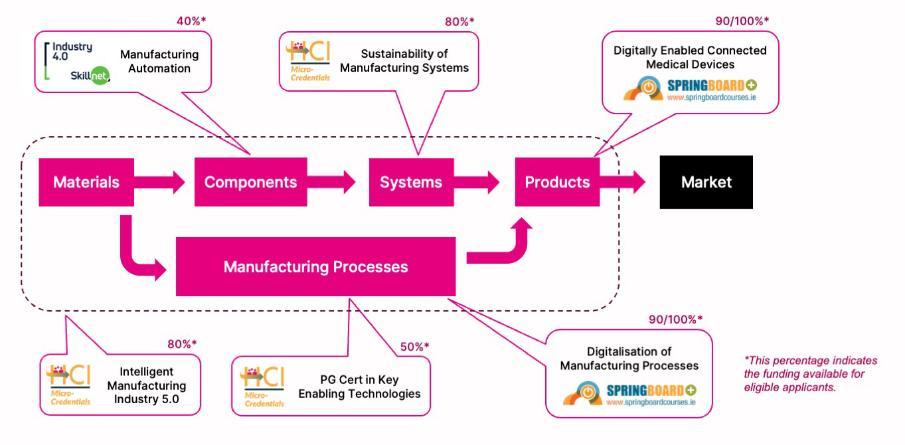-
Courses

Courses
Choosing a course is one of the most important decisions you'll ever make! View our courses and see what our students and lecturers have to say about the courses you are interested in at the links below.
-
University Life

University Life
Each year more than 4,000 choose University of Galway as their University of choice. Find out what life at University of Galway is all about here.
-
About University of Galway

About University of Galway
Since 1845, University of Galway has been sharing the highest quality teaching and research with Ireland and the world. Find out what makes our University so special – from our distinguished history to the latest news and campus developments.
-
Colleges & Schools

Colleges & Schools
University of Galway has earned international recognition as a research-led university with a commitment to top quality teaching across a range of key areas of expertise.
-
Research & Innovation

Research & Innovation
University of Galway’s vibrant research community take on some of the most pressing challenges of our times.
-
Business & Industry

Guiding Breakthrough Research at University of Galway
We explore and facilitate commercial opportunities for the research community at University of Galway, as well as facilitating industry partnership.
-
Alumni & Friends

Alumni & Friends
There are 128,000 University of Galway alumni worldwide. Stay connected to your alumni community! Join our social networks and update your details online.
-
Community Engagement

Community Engagement
At University of Galway, we believe that the best learning takes place when you apply what you learn in a real world context. That's why many of our courses include work placements or community projects.
Intelligent Manufacturing Industry 5.0
The Diploma in Intelligent Manufacturing Industry 5.0
Centre for Adult Learning and Professional Development- Title of Award
- Diploma
- Course Code
- DIM1
- Average Intake
- 25
- Delivery
- Blended Learning
- NFQ
- 8
- Award Type
- Minor
- Next Intake
- September 2026
- Duration
- 1 year, part-time
- ECTS Weighting
- 30
Why Choose This Course?
Course Information
Through hands-on learning, students will develop the knowledge and skills needed to effectively operate and manage enterprises based on intelligent manufacturing and industry 5.0.
Students aspiring towards leadership roles in manufacturing are encouraged to join the course. Students will be given an opportunity to develop this vision by taking modules in Enterprise Simulation for Digital Twinning, Intelligent Data-enabled Manufacturing, and Robotics and Automated Systems.
At the end of the course, students will be able to:
- Identify cases in an industry where intelligent manufacturing is possible in the near or medium term.
- Implement a pathway towards intelligent manufacturing and industry 5.0.
- Analyse how autonomous decision-making is made using real-time data in intelligent manufacturing systems.
- Diagnose problems by thinking critically, innovating and collaborating through team-based work.
- Evaluate, through written and oral communication, technical findings concerning Industry 5.0.
- Value life-long personal and professional attributes including communication, interpersonal, analytical, enterprising and problem-solving skills in vibrant, technologically advanced economies.
The Manufacturing Process
The manufacturing process involves transforming materials into functional components, which are assembled through sustainable, intelligent, manufacturing systems into products. These products are designed to meet specific market needs. Our new advanced manufacturing diplomas respond to employee skills needs at every stage of this process. See the chart below for an overview of related courses and how they align within the overall manufacturing process.

The course consists of three 10 ECTS modules:
- Enterprise Simulation for Digital Twinning with Project
Enterprise simulation is the process of building digital models of whole or part of an enterprise with process models, data models, resource models and/or new processes etc. Digital Twinning deals with the process of understanding an enterprise and improving its performance through creation of computer simulations. It is based on knowledge of the enterprise, its infrastructure, technology and human resources. - Robotics & automated systems with Project
This module aims to enable the learner to describe core elements of automated systems including Robotics, AGVs and Medical device processing equipment, understand project management techniques used in automation and learn some basic robotic programming. - Intelligent Data-Based Manufacturing with Project
The transformation of manufacturing by Machine Learning and Artificial Intelligence is inevitable. This module presents a methodology to accelerate ways to smarter, sustainable and digital manufacturing using intelligent manufacturing systems.
NB: You can take some of the modules listed above as individual standalone micro-credentials. Please see related courses section at the bottom of the webpage.

Each module features a substantial workplace project component, and students are encouraged to join the course with an industry-based project concept. This approach provides valuable opportunities to build transferable skills that can be applied directly in professional settings.
The course is designed for working professionals, allowing them to upskill while employed. It helps participants enhance their employability, address skills gaps, and build key competencies. Jobseekers receive career support through sessions with specialists in the Career Development Centre.
This course will suit professionals in R&D roles within the medical device sector. This course provides the commercial acumen and leadership skills needed to drive innovation and connectivity in the medical device industry by focusing on the digital transformation of manufacturing.
It is designed to equip students with the essential knowledge and hands-on skills needed to effectively operate enterprises based on intelligent manufacturing and Industry 5.0.
Industrially relevant assignments and projects form a key part of this course and allow the students the freedom to apply what they have learned to real-life scenarios, including in their workplace. The applied nature of the assignments and lab activities further anchor this learning and prepare the learner for the workplace.
The identified career pathways specific to this course include:
- Smart Manufacturing Engineer
- Data Analyst in Manufacturing
- AI Specialist in Manufacturing
- Digital Transformation Consultant
Dr Adam Collins
Lecturer, School of Natural Sciences, Physics
Padraig Conneely
Lecturer, School of Engineering, Mechanical Engineering
The course is delivered part-time through a blended learning approach. Learners will be provided with online materials for each module, specifically developed for independent study. These will be complemented by recommended readings and interactive resources where relevant. In-person attendance is required for approximately 10 hours per module, typically scheduled on Saturdays.
Assessment is carried out through a combination of assignments, written examinations, and, where applicable, practical laboratory work. Examinations are scheduled at the end of each semester, and each module is assessed individually.
Course Administrator
Tel: 091 493909
Email: sciencetech@universityofgalway.ie
If you do not meet the standard entry criteria for this course, you may gain entry through our Recognition of Prior Learning (RPL) policy. Applicants may also be able to earn module exemptions based on their prior learning. Find out more here.

Job readiness is integrated across all modules through group work, problem-solving assignments, conflict resolution discussions, and leadership opportunities in team projects.
Experiential learning, including immersion in labs and opportunities for work-based projects, helps learners develop essential transversal skills such as teamwork, communication, creativity and innovation.
Accreditations & Awards
Meet our Employers
Entry Requirements and Fees
Applicants should have a Diploma at NFQ Level 7 of 90 ECTS minimum, in a Science, Engineering or Technical area, or otherwise prove that they satisfy the modules' prerequisites as listed in the course outline section.
Entry requirements for part-time students can be found here (i.e. Age, English language requirements, etc.).
Online Applications will open in April, 2026.
Applications are made online via the University of Galway Applications System. This course is listed under Adult Learning Undergraduate\Postgraduate, CPD, Micro-credentials & Summer School Applications.
Please visit our How to Apply page for Application tips and Supporting Documents information.
NB: Applicants should have a Diploma at NFQ Level 7 of 90 ECTs minimum, in a Science, Engineering or Technical area, or otherwise prove that they satisfy the prerequisites of each of the modules as listed in the course outline section.
Fees for Academic Year 2026/27
| Course Type | Year | EU Tuition | Student Contribution | Non-EU Tuition | Levy | Total Fee | Total EU Fee | Total Non-EU Fee |
|---|---|---|---|---|---|---|---|---|
| UG Diploma | 1 | €2,700 | €3,250 | €70 | €2,770 | €3,320 |
The HEA Micro-credential Learner Fees Subsidy funds this course for micro-credentials and Diplomas between 5 and 30 credits. Candidates who satisfy the HEA eligibility criteria are funded at 80% for this course. Funding is subject to availability of places at the time of application.

Why University of Galway?
World renowned research led university nestled in the vibrant heart of Galway city on Ireland's scenic West Coast.
Downloads
Meet Our Alumni
Introduction
The Diploma in Intelligent Manufacturing Industry 5.0 is forward-looking and provides students with key insights into the future of intelligent manufacturing, with a focus on Industry 5.0. Learners will explore the principles of Industry 5.0 from both a theoretical and practical perspective.





























